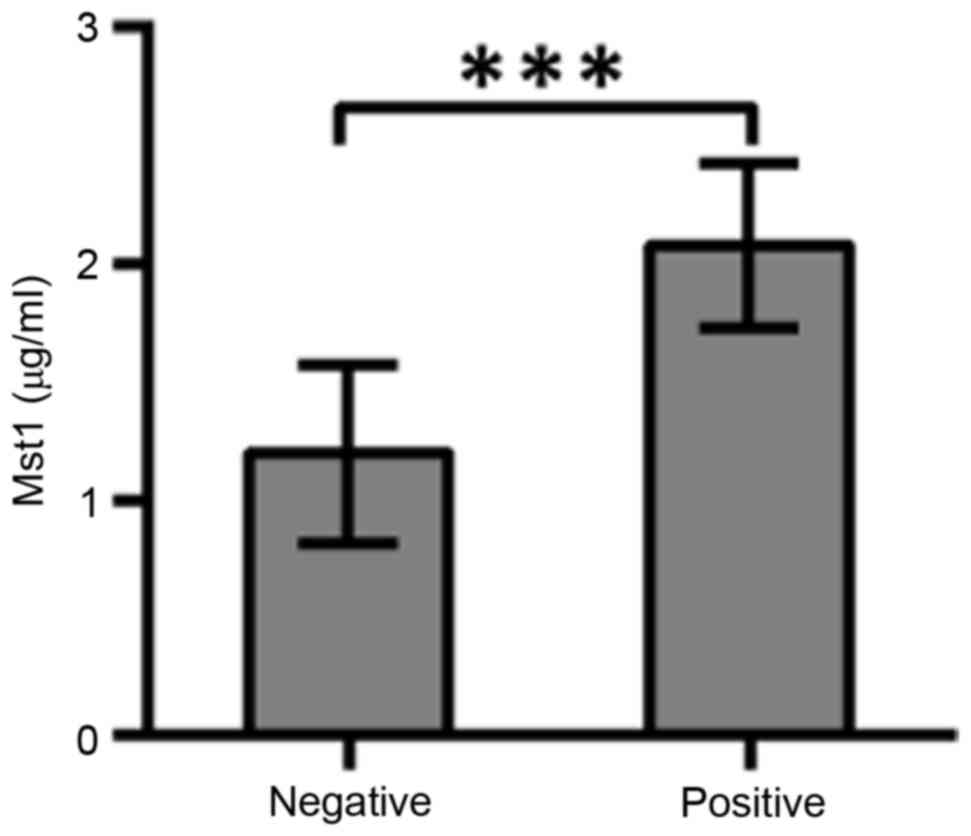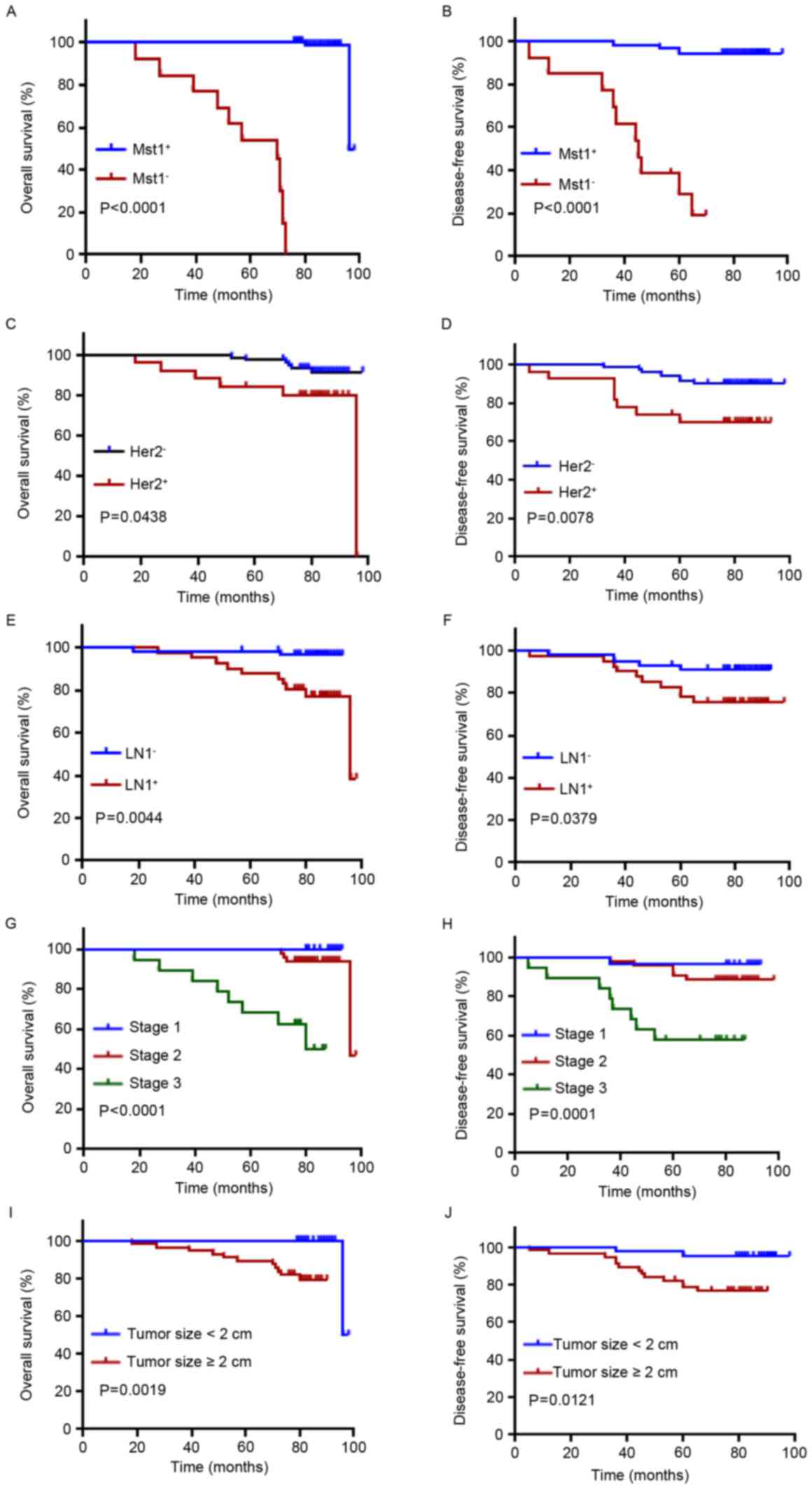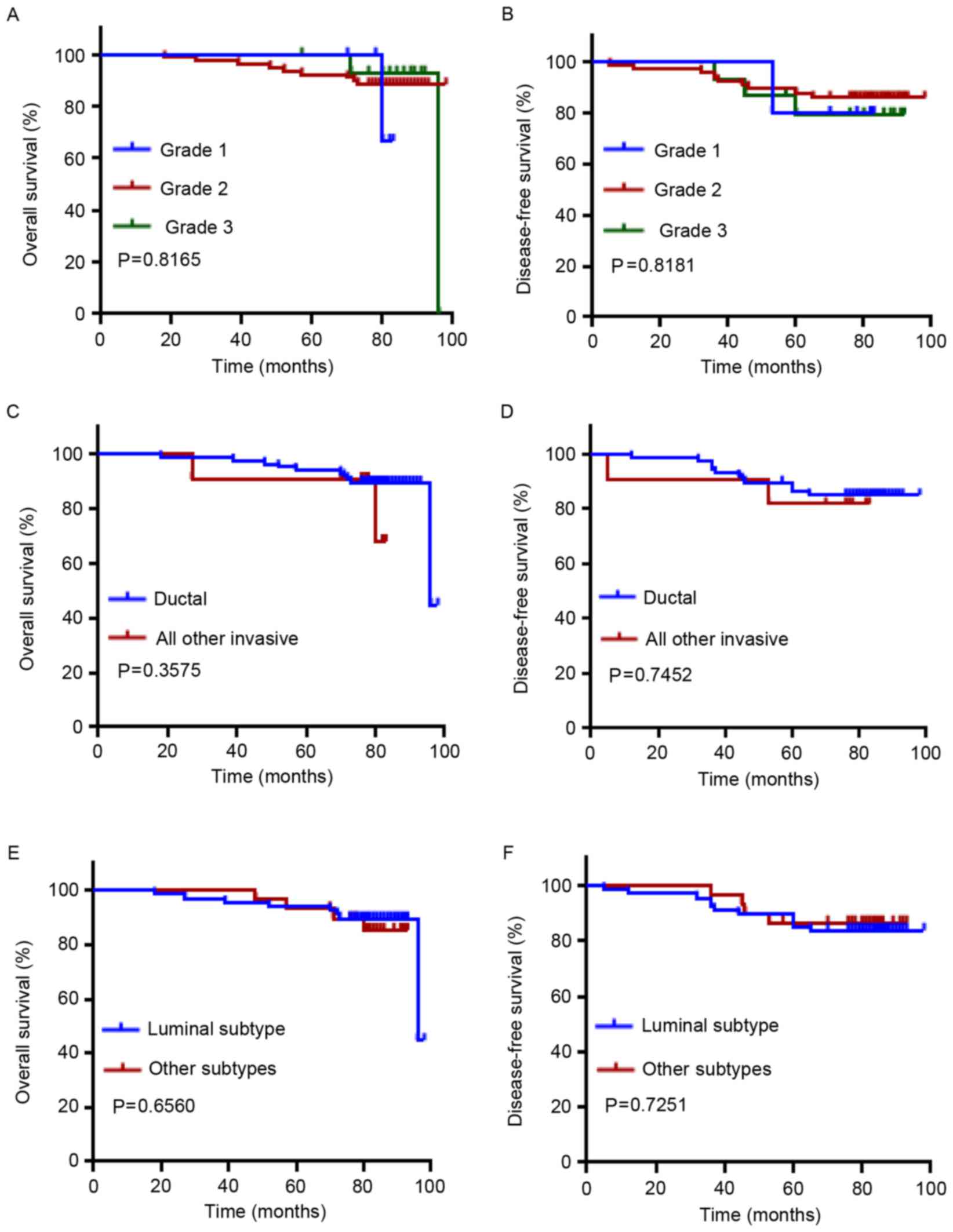|
1
|
Siegel RL, Miller KD and Jemal A: Cancer
statistics, 2015. CA Cancer J Clin. 65:5–29. 2015. View Article : Google Scholar : PubMed/NCBI
|
|
2
|
Torre LA, Bray F, Siegel RL, Ferlay J,
Lortet-Tieulent J and Jemal A: Global cancer statistics, 2012. CA
Cancer J Clin. 65:87–108. 2015. View Article : Google Scholar : PubMed/NCBI
|
|
3
|
Siegel RL, Miller KD and Jemal A: Cancer
statistics, 2016. CA Cancer J Clin. 66:7–30. 2016. View Article : Google Scholar : PubMed/NCBI
|
|
4
|
Swanton C, Burrell RA and Futreal PA:
Breast cancer genome heterogeneity: A challenge to personalised
medicine? Breast Cancer Res. 13:1042011. View Article : Google Scholar : PubMed/NCBI
|
|
5
|
Jackson SE and Chester JD: Personalised
cancer medicine. Int J Cancer. 137:262–266. 2015. View Article : Google Scholar : PubMed/NCBI
|
|
6
|
Tyrer J, Duffy SW and Cuzick J: A breast
cancer prediction model incorporating familial and personal risk
factors. Stat Med. 23:1111–1130. 2004. View
Article : Google Scholar : PubMed/NCBI
|
|
7
|
Yersal O and Barutca S: Biological
subtypes of breast cancer: Prognostic and therapeutic implications.
World J Clin Oncol. 5:412–424. 2014. View Article : Google Scholar : PubMed/NCBI
|
|
8
|
Garg M, Nagpal N, Sidhu DS and Singh A:
Effect of lump size and nodal status on prognosis in invasive
breast cancer: Experience from Rural India. J Clin Diagn Res.
10:PC08–PC11. 2016.PubMed/NCBI
|
|
9
|
Senkus E, Cardoso F and Pagani O: Time for
more optimism in metastatic breast cancer? Cancer Treat Rev.
40:220–228. 2014. View Article : Google Scholar : PubMed/NCBI
|
|
10
|
Marmé F and Schneeweiss A: Personalised
therapy in breast cancer. Onkologie. 35 Suppl 1:S28–S33. 2012.
View Article : Google Scholar
|
|
11
|
Andersen SL, Terry DF, Wilcox MA, Babineau
T, Malek K and Perls TT: Cancer in the oldest old. Mech Ageing Dev.
126:263–267. 2005. View Article : Google Scholar : PubMed/NCBI
|
|
12
|
Lichtman SM: Guidelines for the treatment
of elderly cancer patients. Cancer Control. 10:445–453. 2003.
View Article : Google Scholar : PubMed/NCBI
|
|
13
|
Baird RD and Caldas C: Genetic
heterogeneity in breast cancer: The road to personalized medicine?
BMC Med. 11:1512013. View Article : Google Scholar : PubMed/NCBI
|
|
14
|
Sabatier R, Gonçalves A and Bertucci F:
Personalized medicine: Present and future of breast cancer
management. Crit Rev Oncol Hematol. 91:223–233. 2014. View Article : Google Scholar : PubMed/NCBI
|
|
15
|
Dawson SJ, Rueda OM, Aparicio S and Caldas
C: A new genome-driven integrated classification of breast cancer
and its implications. EMBO J. 32:617–628. 2013. View Article : Google Scholar : PubMed/NCBI
|
|
16
|
Ellsworth RE, Decewicz DJ, Shriver CD and
Ellsworth DL: Breast cancer in the personal genomics era. Curr
Genomics. 11:146–161. 2010. View Article : Google Scholar : PubMed/NCBI
|
|
17
|
Dancey JE, Bedard PL, Onetto N and Hudson
TJ: The genetic basis for cancer treatment decisions. Cell.
148:409–420. 2012. View Article : Google Scholar : PubMed/NCBI
|
|
18
|
André F, Bachelot T, Commo F, Campone M,
Arnedos M, Dieras V, Lacroix-Triki M, Lacroix L, Cohen P, Gentien
D, et al: Comparative genomic hybridisation array and DNA
sequencing to direct treatment of metastatic breast cancer: A
multicentre, prospective trial (SAFIR01/UNICANCER). Lancet Oncol.
15:267–274. 2014. View Article : Google Scholar : PubMed/NCBI
|
|
19
|
Song H, Mak KK, Topol L, Yun K, Hu J,
Garrett L, Chen Y, Park O, Chang J, Simpson RM, et al: Mammalian
Mst1 and Mst2 kinases play essential roles in organ size control
and tumor suppression. Proc Natl Acad Sci USA. 107:1431–1436. 2010.
View Article : Google Scholar : PubMed/NCBI
|
|
20
|
Qin F, Tian J, Zhou D and Chen L: Mst1 and
Mst2 kinases: Regulations and diseases. Cell Biosci. 3:312013.
View Article : Google Scholar : PubMed/NCBI
|
|
21
|
Cinar B, Collak FK, Lopez D, Akgul S,
Mukhopadhyay NK, Kilicarslan M, Gioeli DG and Freeman MR: MST1 is a
multifunctional caspase-independent inhibitor of androgenic
signaling. Cancer Res. 71:4303–4313. 2011. View Article : Google Scholar : PubMed/NCBI
|
|
22
|
Abdollahpour H, Appaswamy G, Kotlarz D,
Diestelhorst J, Beier R, Schäffer AA, Gertz EM, Schambach A, Kreipe
HH, Pfeifer D, et al: The phenotype of human STK4 deficiency.
Blood. 119:3450–3457. 2012. View Article : Google Scholar : PubMed/NCBI
|
|
23
|
Praskova M, Khoklatchev A, Ortiz-Vega S
and Avruch J: Regulation of the MST1 kinase by autophosphorylation,
by the growth inhibitory proteins, RASSF1 and NORE1, and by Ras.
Biochem J. 381:453–462. 2004. View Article : Google Scholar : PubMed/NCBI
|
|
24
|
Graves JD, Gotoh Y, Draves KE, Ambrose D,
Han DK, Wright M, Chernoff J, Clark EA and Krebs EG:
Caspase-mediated activation and induction of apoptosis by the
mammalian Ste20-like kinase Mst1. EMBO J. 17:2224–2234. 1998.
View Article : Google Scholar : PubMed/NCBI
|
|
25
|
Qin F, Tian J, Zhou D and Chen L: Mst1 and
Mst2 kinases: Regulations and diseases. Cell Biosci. 3:312013.
View Article : Google Scholar : PubMed/NCBI
|
|
26
|
Rawat SJ, Creasy CL, Peterson JR and
Chernoff J: The tumor suppressor Mst1 promotes changes in the
cellular redox state by phosphorylation and inactivation of
peroxiredoxin-1 protein. J Biol Chem. 288:8762–8771. 2013.
View Article : Google Scholar : PubMed/NCBI
|
|
27
|
Guo C, Zhang X and Pfeifer GP: The tumor
suppressor RASSF1A prevents dephosphorylation of the mammalian
STE20-like kinases MST1 and MST2. J Biol Chem. 286:6253–6261. 2011.
View Article : Google Scholar : PubMed/NCBI
|
|
28
|
Warfel NA and Newton AC: Pleckstrin
homology domain leucine-rich repeat protein phosphatase (PHLPP): A
new player in cell signaling. J Biol Chem. 287:3610–3616. 2012.
View Article : Google Scholar : PubMed/NCBI
|
|
29
|
Artemenko Y, Batsios P, Borleis J, Gagnon
Z, Lee J, Rohlfs M, Sanséau D, Willard SS, Schleicher M and
Devreotes PN: Tumor suppressor Hippo/MST1 kinase mediates
chemotaxis by regulating spreading and adhesion. Proc Natl Acad Sci
USA. 109:13632–13637. 2012. View Article : Google Scholar : PubMed/NCBI
|
|
30
|
Lin X, Cai F, Li X, Kong X, Xu C, Zuo X
and Yang Q: Prognostic significance of mammalian sterile 20-like
kinase 1 in breast cancer. Tumour Biol. 34:3239–3243. 2013.
View Article : Google Scholar : PubMed/NCBI
|
|
31
|
Pan X, Zeng SL, Yu DH, Liang XL, Ji CD,
Pan BJ, Cai JL, Wang Y, Min Y, Fang W and Liao WQ: Variable domain
of the heavy chain of heavy-chain antibody of the Rv0733 antigen of
mycobacterium tuberculosis panned and identified from a nonimmune
llama VHH phage display library. Int J Clin Exp Pathol.
9:2869–2878. 2016.
|
|
32
|
Yoneda A, Lendorf ME, Couchman JR and
Multhaupt HA: Breast and ovarian cancers: A survey and possible
roles for the cell surface heparan sulfate proteoglycans. J
Histochem Cytochem. 60:9–21. 2012. View Article : Google Scholar : PubMed/NCBI
|
|
33
|
Hirata Banin BK, Oda JM, Guembarovski Losi
R, Ariza CB, de Oliveira CE and Watanabe MA: Molecular markers for
breast cancer: Prediction on tumor behavior. Dis Markers.
2014:5131582014.PubMed/NCBI
|
|
34
|
Esteva FJ and Hortobagyi GN: Prognostic
molecular markers in early breast cancer. Breast Cancer Res.
6:109–118. 2004. View
Article : Google Scholar : PubMed/NCBI
|
|
35
|
Prat A, Parker JS, Karginova O, Fan C,
Livasy C, Herschkowitz JI, He X and Perou CM: Phenotypic and
molecular characterization of the claudin-low intrinsic subtype of
breast cancer. Breast Cancer Res. 12:R682010. View Article : Google Scholar : PubMed/NCBI
|
|
36
|
Kumar R: Breast cancer tumor markers. J
Solid Tumors. 2:432012. View Article : Google Scholar
|
|
37
|
Payne SJ, Bowen RL, Jones JL and Wells CA:
Predictive markers in breast cancer-the present. Histopathology.
52:82–90. 2008. View Article : Google Scholar : PubMed/NCBI
|
|
38
|
Penault-Llorca F and Viale G: Pathological
and molecular diagnosis of triple-negative breast cancer: A
clinical perspective. Ann Oncol. 23 Suppl 6:vi19–vi22. 2012.
View Article : Google Scholar : PubMed/NCBI
|
|
39
|
Minoo P, Zlobec I, Baker K, Tornillo L,
Terracciano L, Jass JR and Lugli A: Prognostic significance of
mammalian sterile 20-like kinase 1 in colorectal cancer. Mod
Pathol. 20:331–338. 2007. View Article : Google Scholar : PubMed/NCBI
|
|
40
|
Seidel C, Schagdarsurengin U, Blümke K,
Würl P, Pfeifer GP, Hauptmann S, Taubert H and Dammann R: Frequent
hypermethylation of MST1 and MST2 in soft tissue sarcoma. Mol
Carcinog. 46:865–871. 2007. View Article : Google Scholar : PubMed/NCBI
|
|
41
|
Cinar B, Collak FK, Lopez D, Akgul S,
Mukhopadhyay NK, Kilicarslan M, Gioeli DG and Freeman MR: MST1 is a
multifunctional caspase-independent inhibitor of androgenic
signaling. Cancer Res. 71:4303–4313. 2011. View Article : Google Scholar : PubMed/NCBI
|
|
42
|
Oh HJ, Lee KK, Song SJ, Jin MS, Song MS,
Lee JH, Im CR, Lee JO, Yonehara S and Lim DS: Role of the tumor
suppressor RASSF1A in Mst1-mediated apoptosis. Cancer Res.
66:2562–2569. 2006. View Article : Google Scholar : PubMed/NCBI
|
|
43
|
Lehtinen MK, Yuan Z, Boag PR, Yang Y,
Villén J, Becker EB, DiBacco S, de la Iglesia N, Gygi S, Blackwell
TK and Bonni A: A conserved MST-FOXO signaling pathway mediates
oxidative-stress responses and extends life span. Cell.
125:987–1001. 2006. View Article : Google Scholar : PubMed/NCBI
|
|
44
|
Avruch J, Zhou D, Fitamant J, Bardeesy N,
Mou F and Barrufet LR: Protein kinases of the Hippo pathway:
Regulation and substrates. Semin Cell Dev Biol. 23:770–784. 2012.
View Article : Google Scholar : PubMed/NCBI
|

















